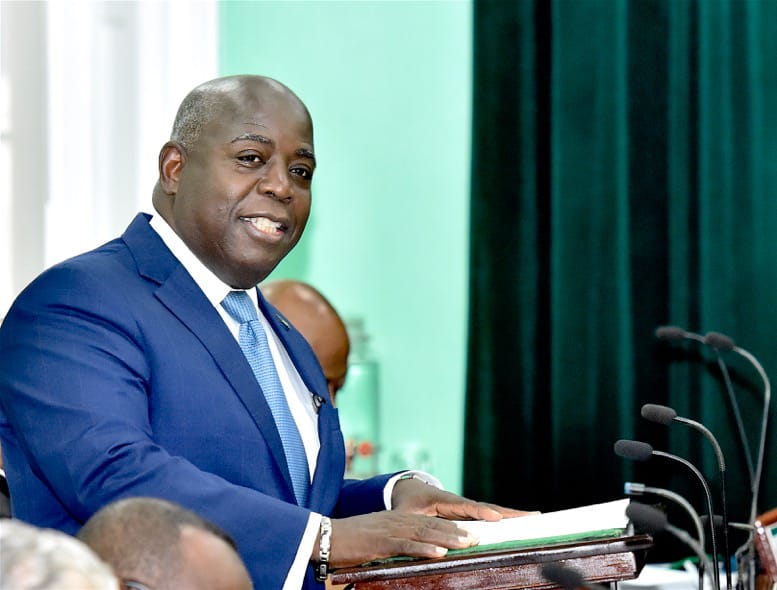
NASSAU, The Bahamas – Prime Minister and Minister of Finance the Hon. Philip Davis said in the House of Assembly, on May 31, 2023, that public revenue receipts were strong over the nine-month period of July 2022 to March 2023, due to legislative reform, effective policy decisions, strengthened economic conditions and more efficient collection efforts.
“Analysis of the trends of the first three quarters of this fiscal year, and the years prior, suggest that the government is potentially set to exceed the $2.85 billion target set forth in the February 2023 Mid-year Supplementary Budget,” he said, during his Communication on Budget 2023.
“I am confident the revenue outturn at the end of the Fiscal Year 22/23 will near $2.9 billion.
Public spending has remained on track, and is well within the budgeted amount,” Prime Minister Davis added. “For this reason I am confident that expenditure at end of the Fiscal Year 2022/23 will almost reach the target of $3.1 billion set in the Supplementary Budget.”
He pointed out that the primary balance will, therefore, record a surplus of $68.4 million at the end of the fiscal year, a $54.8 million increase from the $13.6 million surplus projected in the supplementary budget.
“Likewise, the overall deficit is expected to improve to $520.6 million, down from the $575.4 million outlined in the supplementary budget,” he said.
Speaking of Government financing, Prime Minister Davis said that The Bahamas’ borrowing costs had begun to experience a downward trend in the previous quarter; but the cost of borrowing rose at the end of March 2023.
“At the end of the third quarter, the total average cost of borrowing for current outstanding debt had risen to an interest rate of 5.55 percent,” he pointed out. “This is notably higher than the previous year’s rate of 4.93 percent at the end of March 2022.
“This increase in borrowing costs is primarily attributable to the higher costs associated with external loan facilities.”
He added that, more specifically, the average interest rate for external financing had risen by 1.99 basis points, resulting in a rate of 5.55 percent as of March 2023, compared to the preceding year’s 3.56 percent.
“Throughout the past year, the interest rate policies of the major Central Banks have been restrictive, with a series of interest rate increases,” Prime Minister Davis said. “These adjustments have been primarily motivated by the escalation of inflation, and the resulting upsurge in interest rates has had an impact on the Bahamas’ external borrowing costs.”
He added: “However, the cost of borrowing in the domestic market has been declining over the past quarters.
Looking at it in more detail, we can see that:
- The average interest cost for domestic loanssubsided by 27 basis points to 4.62 percent at end of March 2023, from 4.89 percent in the previous year;
- And the average interest cost for domestic bondssubsided by 3 basis points to 4.63 percent at the end of March 2023 from 4.66 percent in the previous year.”
Prime Minister Davis noted that those statistics affirmed the Government’s latest medium-term debt strategy, which aimed to shift its borrowing away from costly external commercial debt.
“Such debt has seen a sharp increase over the past five years, including recent interest rate hikes,” he said. “This strategic move will enable the government to once again rely predominantly on the domestic market to meet its financing requirements.”
Prime Minister Davis pointed out that, when considering the maturity of debt, or the average time it takes to repay the principal amount in the government’s debt portfolio, a longer maturity period led to a reduction in refinancing risk.
“In essence, prioritizing longer maturities is key to managing debt effectively,” he said. “And so another element of the government’s medium-term debt management strategy is the goal of prolonging the average maturity time of its debt.”
Prime Minister Davis said that, in the face of “unprecedented turbulence” in the global financial markets, the Government was able to maintain its average time to maturity.
“At end of March 2023, the average time to maturity has decreased slightly to 6.7 years, down from the previous 6.8 years in March 2022,” he said. “This variance is due solely to the external loan component, as the average time to maturity on internal debt has remained steady at 7.1 years.”
“This highlights the significance of maintaining a prudent approach to debt management, and aligning this administration’s practices with the government’s optimal debt strategy,” Prime Minister Davis added.
“It is imperative that we continue to exercise prudence in this area to ensure financial stability.” (BIS Photos/Ulric Woodside)







